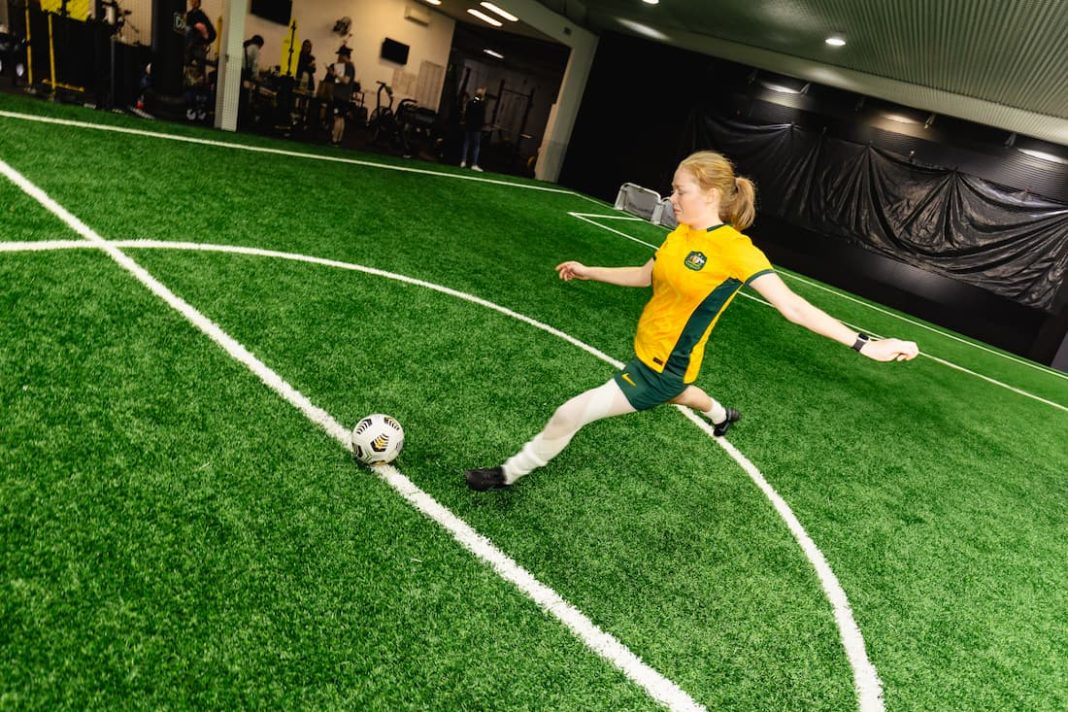Having a stroke, encephalitis, a stress fracture, and concussions over the past few years – and learning to walk again – didn’t stop Canberra-based soccer player Rebecca Jones from representing her country.
Rebecca represented Australia at the 2024 IFCPF (International Federation of Cerebral Palsy Football) Women’s World Cup, scoring three goals in her international debut. The team went on to win the tournament.
She is part of the ParaMatildas, which formed in 2022, as Australia’s first national team for women and girls with cerebral palsy, acquired brain injury and symptoms of stroke.
“Getting into the team was one of my biggest achievements,” Rebecca told CD.
“The last four years have not been the easiest for me. I’ve been in hospital with encephalitis, had a stroke, learnt to walk again, had stress fractures, and a couple of concussions.
“It’s not been easy, but soccer is a good distraction.
“Having the goal of going to the World Cup helped with the challenging days. Stepping onto the field with my Australian teammates was pretty incredible.”
Rebecca said if you told her in hospital four years ago she would represent Australia, she would not have believed you.
“Scoring three goals was very special, but it is hard to put the whole experience into words,” she said.
Rebecca is originally from Sydney but is based in Canberra most of the year while studying.
She just completed a Bachelor of Health Sciences at the Australian National University and is now undertaking an honours degree.
Rebecca was born able-bodied but a stroke several years ago left her living with a disability.
While she has no competitions coming up, the ParaMatilda continues to train on her own to keep her fitness up.
“At the moment, I’m working on plans that will come up later in the year,” Rebecca said.
“There’s nothing locked in at the moment, so it’s just waiting to see how the year progresses but hopefully there will be some later in the year.”
She has previously played for Canberra United Academy.
Rebecca currently trains once a week with a local all-abilities, all-ages team.
The ParaMatilda has played soccer since she was four. She said the thing she enjoyed the most was being part of a team.
“Because within the team you need cohesion and a level of trust between the players, so you have to get to know the other players,” Rebecca said.
“In para soccer, you need to learn everyone’s strengths and limitations and what they can do…
“I can’t kick with my left (foot) and I can’t trap with it either, so people would learn to pass to my right side.
“Just learning what our strengths are and the limitations in our movements.”
She said it added a level of complexity and challenge to playing soccer.
“It’s pretty special when you get to play in a team environment while pushing yourself,” Rebecca said.
She said there were many barriers for people who live with a disability to play soccer, including a lack of access to opportunities, and extra expenses and requirements.
Rebecca said it was exciting to see a rise in women playing soccer because when she started 20 years ago, she was often the only female on the field.
Soccer stats from Allianz Australia:
- Fifty per cent of children who live with a disability have decided to stop playing sports by the age of 11.
- A quarter of parents of children with a disability (24 per cent) say there is a need for increased access to sports for children with a disability.
- For parents of a child with a disability, the top motivators for staying in sport are being cheered on when they play (86 per cent), feeling their support network is proud of them (85 per cent) and receiving positive words of affirmation (84 per cent).



